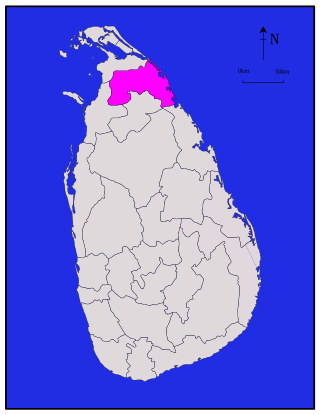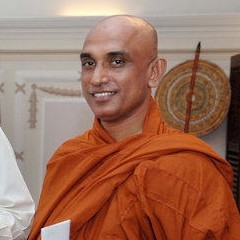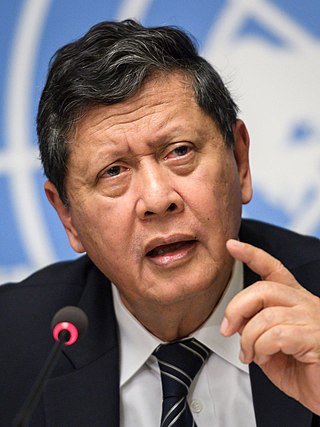
Provinces are the first level administrative divisions of Sri Lanka. Currently,Sri Lanka is divided into 9 provinces. Each province is further divided into districts,which are further divided into divisional secretariats.

Matara is a district in Southern Province,Sri Lanka. It is one of 25 districts of Sri Lanka,the second level administrative division of the country. The district is administered by a District Secretariat headed by a District Secretary appointed by the central government of Sri Lanka.

Karunasena Kodituwakku is a Sri Lankan politician,academic and diplomat. He was educated at St. Servatius' College,Matara. He was the Sri Lankan ambassador to China,and non-resident ambassador to Mongolia and North Korea. He was the former Sri Lankan Cabinet Minister of Education,Human Resources Development and Cultural Affairs and the third governor of the North Western Province of Sri Lanka. He also served as the vice chancellor of University of Sri Jayewardenepura and Sri Lankan ambassador to Japan and Republic of Korea.
His Excellency Mahinda Buddhadasa Samarasinghe is a former MP and the current Ambassador of Sri Lanka to the United States and Mexico and High Commissioner to Trinidad and Tobago.
Jeevan Thiagarajah is a Sri Lankan Tamil civil servant,human rights activist,social activist who also served as the Governor of the Northern Province between 2021 and 2023.

Mullivaikal Hospital was a makeshift hospital located in the Safe Zone in northern Sri Lanka. An alleged series of shellings and aerial attacks began on 23 April 2009 when the Mullivaikal Hospital was hit by three artillery shells. It continued on 28 and 29 April when the Mullivaikkal Primary Health Center was hit multiple times over two days with six killed and many injured including one medical staffer. On the 29th and the 30th the Mullivaikal Hospital was again hit multiple times with nine more killed and fifteen injured. There were two attacks against the Mullivaikal Hospital on 2 May,one at 9 a.m. and a second at 10.30 a.m. resulting in sixty-eight killed and eighty-seven wounded,including medical staffers. On the morning of 12 May 2009 it was hit by an artillery mortar,killing at least forty-nine patients and injuring more than fifty others. All of these attacks were allegedly by the Sri Lankan Army;however,the Sri Lankan Government denied the allegation stating there is no evidence.
Lakshman Yapa Abeywardena is a Sri Lankan politician who served as the Governor of the North Western Province and as the Governors of the Southern Province of Sri Lanka. A former representative of Matara District for the United People's Freedom Alliance in the Parliament of Sri Lanka,he served as the cabinet minister of parliamentary affairs,Minister of Media,Deputy Minister of Economic Development,Minister of Foreign Employment Welfare,deputy minister of civil aviation and as the cabinet minister of Investment Promotion. He was the state minister for State Enterprise Development in the government of President Maithripala Sirisena. He has been in parliament from 1994 and 2019.

Dullas Daham Kumara Alahapperuma is a Sri Lankan politician and founder and current leader of the Freedom People's Congress. Alahapperuma is also a former Cabinet Minister of Information and Mass Media and a current Member of Parliament from the Matara District.

Venerable Athuraliye Rathana Thero,is a Sri Lankan Bhikkhu politician and a Member of Parliament. He is the only representative from Our Power of People's Party in the current parliament.
Chitta Ranjan De Silva,PC was a Sri Lankan lawyer. He was Attorney General and Solicitor General of Sri Lanka. He was the Chairman of the Lessons Learnt and Reconciliation Commission.
The Lessons Learnt and Reconciliation Commission was a commission of inquiry appointed by Sri Lankan President Mahinda Rajapaksa in May 2010 after the 26-year-long civil war in Sri Lanka to function as a Truth and reconciliation commission. The commission was mandated to investigate the facts and circumstances which led to the failure of the ceasefire agreement made operational on 27 February 2002,the lessons that should be learnt from those events and the institutional,administrative and legislative measures which need to be taken in order to prevent any recurrence of such concerns in the future,and to promote further national unity and reconciliation among all communities. After an 18-month inquiry,the commission submitted its report to the President on 15 November 2011. The report was made public on 16 December 2011,after being tabled in the parliament.
The Report of the Secretary-General's Panel of Experts on Accountability in Sri Lanka was a 2011 report produced by a panel of experts appointed by United Nations Secretary-General (UNSG) Ban Ki-moon to advise him on the issue of accountability with regard to any alleged violations of international human rights and humanitarian law during the final stages of the Sri Lankan Civil War. The report is referred to by some as the Darusman Report,after the name of the chairman of the panel.
Amrith Rohan Perera,PC is a Sri Lankan lawyer and diplomat,and former Permanent Representative of Sri Lanka to the United Nations since April 2015. He was a former legal adviser to the Ministry of Foreign Affairs and Chairman of the United Nations Ad Hoc Committee on Comprehensive Convention on International Terrorism. He is a current member of the International Law Commission Perera has also served as a member of the Lessons Learnt and Reconciliation Commission and adviser to the All Party Representatives Committee.

Marzuki Darusman is an Indonesian lawyer and human rights campaigner who served as the Attorney General of Indonesia from 1999 to 2001. He currently serves as the chairman of an UN Human Rights Council mission on Myanmar since July 2017. He is the Director-General of the Human Rights Resource Centre for ASEAN.
The Government of the Northern Province refers to the provincial government of the Northern Province of Sri Lanka. Under the Sri Lankan constitution the nine provincial governments of the country have power over a variety of matters including agriculture,education,health,housing,local government,planning,road transport and social services. The constitution also gives them powers over police and land but successive central governments have refused to devolve these powers to the provinces. Legislative power rests with the Northern Provincial Council whilst executive power rests with the Governor and Board of Ministers.

The following is a timeline of the Presidency of Maithripala Sirisena from his first announcement as presidential candidate in November 2014 to the present.

Tore Hattrem is a Norwegian diplomat and politician for the Conservative Party. In 2018 he was appointed as the Permanent Under-Secretary of State of the Ministry of Foreign Affairs,the top civil servant in the ministry. He formerly served as State Secretary and as Permanent Representative of Norway to the United Nations in New York,and was President of the UNICEF Executive Board in 2018.
The Office on Missing Persons (OMP)' is a Sri Lankan government department tasked with bringing closure to suffering victims and their relatives by determining the status of all missing persons in Sri Lanka. It is the first pillar of four "Transitional Justice mechanisms" proposed by the Sirisena–Wickremesinghe administration in the aftermath of the Sri Lankan Civil War. The Office On Missing Persons Act,No. 14 of 2016 provides for:
"...the establishment of the office on missing persons;to provide for the searching and tracing of missing persons;to provide assistance to relatives of missing persons;for the setting up of a database of missing persons;for setting out the procedures and guidelines applicable to the powers and functions assigned to the said office;and to provide for all matters which are connected with or incidental to,the implementation of the provisions of this act.










